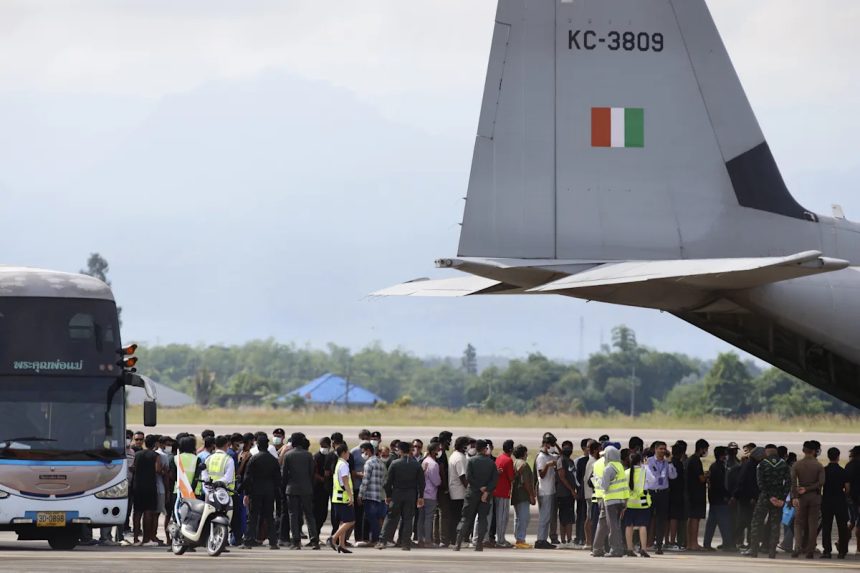BANGKOK (AP) — It often starts with a text message asking if you are available on weekends, looking for a part-time job or you get a simple “hello” from an unknown number. Halfway across the world, a laborer is usually pulling in 12-16 hour days, sending non-stop messages, hoping someone will take the bait.
The ultimate goal is always to take your money — victims have lost tens of billions to scams and hundreds of thousands of people are in forced labor to keep the schemes going. These workers are often housed in massive complexes scattered across southeast Asia, where the industry has flourished.
Here is why rooting out the scamming industry is such a complex issue:
The crackdown in Myanmar
The Myanmar military last month went into one of the most well-known scam compounds — the massive KK Park, along the border with Thailand — and announced its shutdown, though civil society groups later said parts of the compound are still operating.
The workers fled, with about 1,500 laborers — hundreds of them from India but also Chinese, Filipinos, Vietnamese, Ethiopians and Kenyans, among other nationalities — crossing into Thailand. Troops then demolished several structures within the massive complex, according to Thai military officials.
Thailand is now working with India and other foreign governments to repatriate their citizens. On Thursday, one of the largest groups of workers was flown home aboard Indian air force transport planes and more are to return next week.
However, KK Park was just one of dozens such centers along the Thai-Myanmar border and hundreds across Southeast Asia.
Emerging from casinos and illegal gambling
Scam compounds are often located in rural areas, sprawling complexes with sleeping quarters, shops and entertainment venues for the staff.
They are constructed on a model where developers may build out a single property and then lease out the space inside to various companies.
They often operate with the protection of local elites. Smaller operations also exist — housed in one floor of legitimate office buildings, or even a rented house in an urban area.
The centers originated from casinos — both online and physical casinos that mushroomed across Southeast Asia. The United Nations Office on Drugs and Crime counted more than 340 licensed and non-licensed casinos in 2021 alone.
The casinos and attached junket tours attracted high-rollers from China, where gambling is outlawed and are operated by Chinese criminal groups.
During the pandemic, visiting such locations became difficult amid strict travel restrictions. Lacking customers, some online casinos shifted their work model to a criminal operation: defrauding targets from all over the world through digital schemes.
Relying on both trafficked and willing labor
It’s estimated that at least 120,000 people across Myanmar may be held in situations where they are forced to work on online scams, with another 100,000 people in Cambodia, according to a 2023 Office of the United Nations High Commissioner for Human Right report.
The numbers are estimates at best, but scam centers rely on a mix of trafficked and willing laborers, lured by false promises of relatively high salaries and an easy office job.
Early on, workers came from China and Chinese speaking countries, but now the U.N. drugs and crime office says laborers are drawn from 56 countries, from Indonesia to Liberia.
The reality is a stark contrast from their expectations — their passports are often confiscated to keep them from leaving the complex. Only very senior managers and trusted lieutenants are able to have freedom of movement, workers have said. Workers who don’t perform are beaten or face other physical punishments.
A global scourge
Scammers don’t discriminate — they target people across the world, aided by translation tools that are powered by artificial intelligence.
In the Philippines, authorities raided a complex in March 2024 where workers had been targeting Chinese nationals in an investment scheme. Working off a script, the scammers pretended they were a high-ranking employee at the state-owned China National Petroleum Corporation and got their targets to invest in crude oil futures, according to a copy of a script seen by The Associate Press.
Last month, about 50 South Koreans were repatriated from Cambodia, arrested over previous several months on accusations they worked for online scam organizations.
Also recently, U.S. prosecutors unveiled an indictment against Chen Zhi, Chinese-Cambodian businessman on charges of defrauding people in a massive criminal network. The prosecutors charge that his organization scammed 250 Americans out of millions of dollars, with one losing $400,000 alone in cryptocurrency.
In 2024, Americans lost at least $10 billion to Southeast Asia-based scams, according to the U.S. Treasury Department.
The victims
Scams vary in how they’re carried out, ranging from investments in cryptocurrency, to online task scams where people are asked to top-up to get their next task — with real money sometimes paid out in the earlier stages of a scam.
Many scammers build a sense of urgency when asking for an investment, saying the target will miss out if it’s not done by a certain time.
Despite government efforts to crack down and free workers trapped in scam centers, and raids that have shut down some compounds, activists say the main culprits are still at large. There are new reports of scam centers continue to surface both in Southeast Asia and across the world
A United Nations report in April said scammers have bilked victims out of billions of dollars through false romantic ploys, bogus investment pitches and illegal gambling schemes reported operating as far afield as Africa and Latin America.
“If we only rescue the victims, and don’t arrest anybody, especially the Chinese mafia and those transnational syndicates, then there will be no point,” said Jay Kritiya, the coordinator of the Civil Society Network for Victim Assistance in Human Trafficking.
“They can get more victims … they can scam anytime,” said Kritiya, who has rescued forced laborers from scam compounds.









